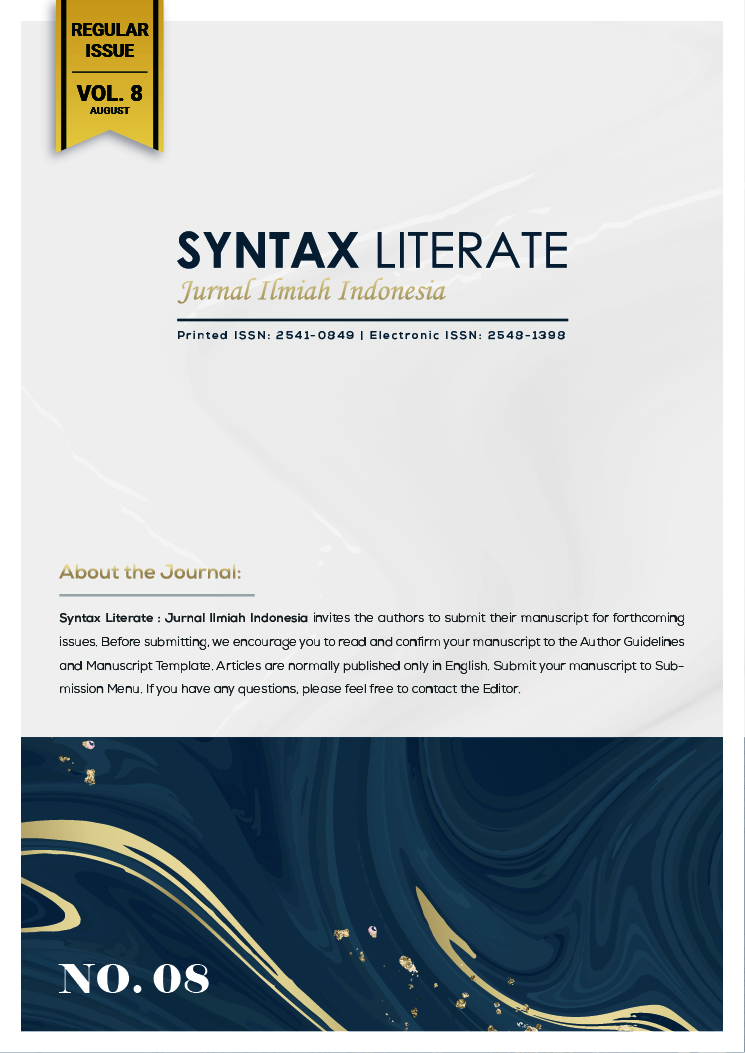The Influence of Emotional Intelligence on Learning Motivation for Students at Buddhist College
Abstract
The research aims to investigate the influence of emotional intelligence on students' learning motivation. Conducted at Jinarakkhita Buddhist College among second-semester students, this study seeks to establish the significant relationship between emotional intelligence and the level of learning motivation. Utilizing a quantitative approach, the study involves data collection from second-semester students at Jinarakkhita Buddhist College using a research instrument that has undergone validity and reliability testing. Statistical analysis is performed to test hypotheses and assess the association between emotional intelligence and learning motivation. The findings of this research will contribute to a deeper comprehension of the significance of emotional intelligence in shaping students' learning motivation. The implications of this study can provide valuable information for educational institutions to enhance the development of students' emotional intelligence and learning motivation.
Downloads
References
Abdullah, A. S., Rahmat, R. A., & Yasin, R. M. (2019). The Relationship between Emotional Intelligence and Learning Motivation among Secondary School Students. International Journal of Academic Research in Business and Social Sciences, 9(11), 1407-1420.
Aghdam, B. A. and Mahjoub, A. (2013) ‘The effect of emotional intelligence on performance and motivation of staff Case Study ( East Azarbaijan the Red Crescent )’, International Journal of Management Academy, 1(2), pp. 109–120.
Bryman, A. (2016). Social research methods. Oxford University Press.
Deci, E. L., & Ryan, R. M. (2000). The "what" and "why" of goal pursuits: Human needs and the self-determination of behavior. Psychological Inquiry, 11(4), 227-268.
Field, A., Miles, J., & Field, Z. (2012). Discovering statistics using R. Sage.
Goleman, D. (2003). Emotional Intelligence: Working with Emotional Intelligence. New York: Bantam Books.
Goleman, D. (2019). Emotional Intelligence: Why It Can Matter More Than IQ. Bantam.
Hair, J. F., Black, W. C., Babin, B. J., & Anderson, R. E. (2019). Multivariate data analysis. Cengage Learning.
Handayani, A., & Septhiani, V. (2021). Kecerdasan Emosional dan Motivasi Berprestasi pada Siswa. Jurnal Pendidikan Psikologi, 20(1), 12-25.
Laia, B. (2021) ‘Hubungan Kecerdasan Emosional Dengan Motivasi Belajar Ips Terpadu Siswa Smp Negeri 2 Amandraya’, Jurnal Education and Development, 9(2), pp. 511–516.
Lumpkin, A., & Achen, RM (2018). Emotional Intelligence and Motivation: The Role of Emotional Intelligence in Learning and Achievement. In Handbook of Motivation at School (pp. 279-300). Routledge.
Misnawati. 2016. The Relationship between Emotional Intelligence and Online Game Addiction in Students. Journal of Scientific Psychology. Psychoborneo, Vol. 4, No. 2. 217-223
Mohammadzadeh, M., Khajavy, GH, & Hosseini, FA (2012). Emotional Intelligence and Motivation for Learning: Mediating Role of Self-Regulated Learning Strategies. Procedia - Social and Behavioral Sciences, 32, 510-515. doi:10.1016/j.sbspro.2012.01.076
Pallant, J. (2016). SPSS survival manual. McGraw-Hill Education.
Pintrich, PR, & Schunk, DH (2002). Motivation in education: Theory, research, and applications (2nd ed.). Pearson Education.
Pintrich, PR (2003). A Conceptual Framework for Assessing Motivation and Self-Regulated Learning in College Students. Educational Psychology Review, 15(2), 101-126.
Saifuddin, AB (2019). Quantitative research methods. Student Library.
Santrock, JW (2007). Educational Psychology. Jakarta: Kencana Prenada Media Group.
Santrock, JW (2007). motivation. In Life-span development (pp. 296-298). McGraw-Hill.
S. Eccles (Eds.), Development of Achievement Motivation (pp. 3-25). Academic Press.
Wigfield, A., & Eccles, J. S. (2002). Development of achievement motivation. In A. Wigfield & J.
Yusri, NA, Kibtiyah, M. and Hamim, T. (2020) 'Emotional Intelligence with Learning Achievements Reviewed from Islamic Education', International Journal of Islamic Educational Psychology , 1(2), pp. 112–125. doi: 10.18196/ijiep.v1i2.9672.
Copyright (c) 2023 Wistina Seneru, Sidartha Adi Gautama, Widiyanto Widiyanto, Ayu Andriyaningsih, Ine Yudhawati

This work is licensed under a Creative Commons Attribution-ShareAlike 4.0 International License.











